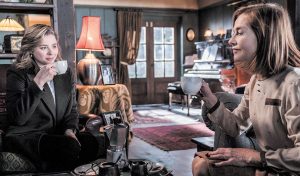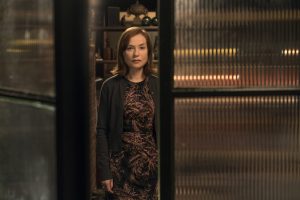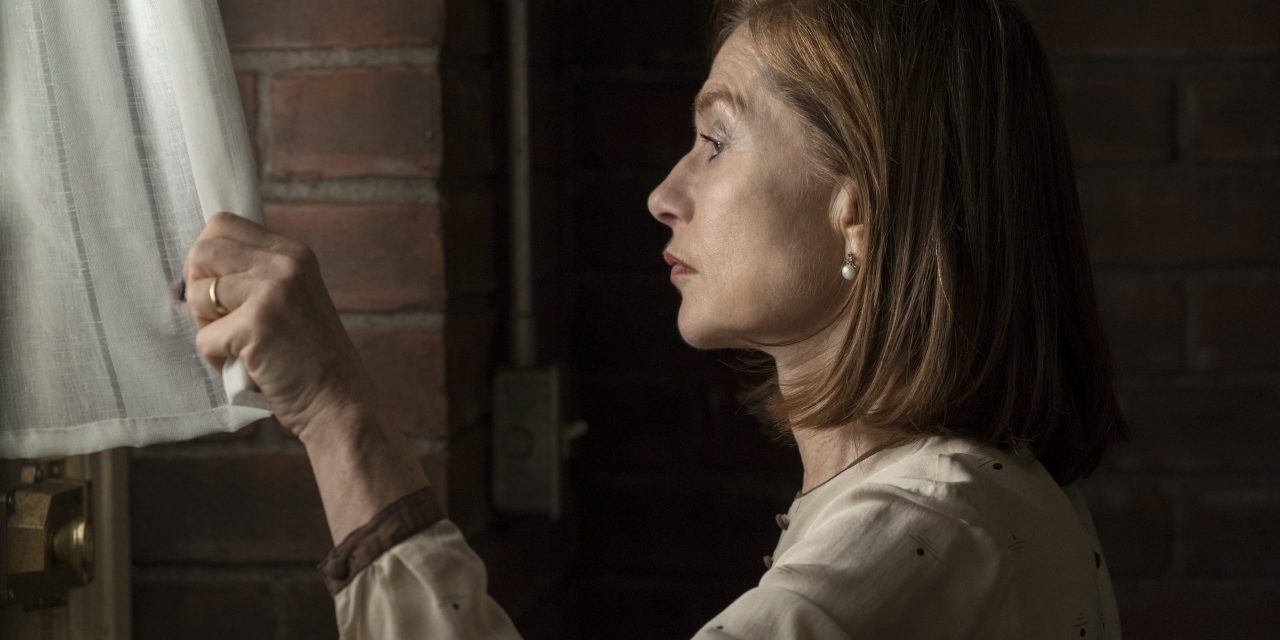I’m saying goodbye to Isabelle Huppert, grande dame of French cinema with over 100 films to her name. But this is not goodbye. Quiet aside from a savory “mmm” here and another savory “mmm” there, Huppert has wandered back to my line of questioning about Greta, her wild new film from director-writer Neil Jordan (The Crying Game), and its queer resonance. Publicist-monitored time is seemingly of no concern to her.
And so I’m still saying goodbye, this time also thanking the star of The Piano Teacher, Amour, Heaven’s Gate and 2016’s Elle, for which she was nominated for an Oscar for best actress.
Silence.
“Yeah, but it’s interesting,” she starts again, absorbed in thought as she reflects on playing the titular crazy old lady. “I’m happy that you bring it up, because of course this attraction from that woman toward young girls, you can make many readings about it.”
Is she implying that Greta’s interest in these young women could be sexual? “I didn’t consciously think of it,” she adds, “but it’s there, of course. It lingers.”
Roped into Greta’s subtextually Sapphic scheming is Chloë Grace Moretz’s poor Frances, a New York waitress who out of the goodness-but-misguidedness of her heart returns a handbag to the sadistic stalker (Huppert). And talk about lingering: You won’t soon forget Huppert doing that Chopin murder-dance. Or gum! Which is to say Juicy Fruit will now be haunting you when you least expect it.
Huppert, 65, recently spoke about playing bad women including in Greta (which Dallas Voice reviewed here), her many LGBTQ-themed films, and the queer community’s relationship to camp.
— Chris Azzopardi
Dallas Voice: John Waters once said you play a lot of bad women, but you corrected him and said, “No, I play women in bad situations.” Isabelle Huppert: That’s right. But this time, this one is a really bad one! She’s in a very bad situation and she’s a very bad woman, and she’s very different from all the others I’ve been playing so far.
In what ways? She’s different in the sense that she has not the least bit of innocence in her. I mean, she’s really a psychopath and, in a way, a kind of monster. When you go that far, when you cross the border like she does, there’s nothing to make whatever she does legitimate or justified, so she’s a monster. But the movie is not psychological. The movie doesn’t try to give you explanation or justification; it just shows the facts and just the facts. And it’s also very highly stylized in the sense that it’s sometimes very funny, and there’s also a great sense of humor.
Did you read the camp elements before shooting? Not really, actually. I liked the script and that’s why I did it. It was enough for me to do it, and also because I knew Neil Jordan was going to direct — so, of course! If it wasn’t him directing, or let’s say a name of someone that I could expect to be a great director, I’m not sure I would have done it the same way. But given I knew he was going to do it and that he added some elements, like the fact that she plays the piano — and, at the end, the staging — made it all. The design, the apartment where she lives and the whole atmosphere of the film is very, very special. It’s a bit out of time, also. There’s something a bit timeless, which I think makes it a bit more mysterious. At the same time a tale, not a fairy tale…
But I see where you’re going with that. I picked up some Hansel and Gretel parallels. And also, the name of my character — Greta — reminds you of this kind of tale with the innocent, the good and the bad, the white and the black, and that’s what I like, also. But the movie, it really deals with stereotypes: what it means to be good, what it means to be bad, what it means to be innocent, what it means to be guilty.
You said you’ve never quite played a woman like this before. What steps did you take to prepare for Greta? I didn’t really have to take any steps myself. Neil gave us a lot of freedom; I just played it the way she was written. I didn’t really bother. I didn’t try to make her more nice or more horrible. She appears very innocent and almost invisible at the beginning. A bit weird. The way she lives in this old apartment, it’s a bit like she was coming from another time. But that was it, you know?
That’s why I’m saying you just have to get yourself [in character] just by the facts, nothing else. And not trying, of course, to bring any element of emotion that would be completely irrelevant, even though there is a kind of emotion, but emotion is certainly not the right word. But, for instance, when you find out where she keeps all her victims in this room that is completely from another time, with all these dolls and teddy bears, something that’s a threat, it’s very disturbing.
This story is one that I could see John Waters having a lot of fun with. Absolutely. I mean, John Waters. Dario Argento also. All these kinds of people who play with stereotypes with great freedom, because there is this ironical dissonance and, again, there is great stylization in the film, which makes it very, very special. So, again, on one hand you can call it a thriller and something really mainstream, but on the other hand it’s really sophisticated, which I like about it. Otherwise, it would’ve been one more thriller. It’s a bit more than that. And I like the reference to John Waters, who I love, by the way, as a filmmaker.
Why haven’t you worked with him? Oh, I would love to! Maybe I’m not fat enough to work with him.
 Are you aware of why LGBTQ audiences might respond to the sort of winking humor of this film more than other audiences? Yes, maybe because there is something provocative in a very good sense, and there is also a freedom to it, and when all the codes are kind of scattered and it’s beyond the good taste, that’s where you find some truth about life, about what it means to be a woman, about what it means to be a man.
Are you aware of why LGBTQ audiences might respond to the sort of winking humor of this film more than other audiences? Yes, maybe because there is something provocative in a very good sense, and there is also a freedom to it, and when all the codes are kind of scattered and it’s beyond the good taste, that’s where you find some truth about life, about what it means to be a woman, about what it means to be a man.
I played this monologue directed by the great stage director Bob Wilson years ago [in 1993–1995, and based on the novel by Virginia Woolf] called Orlando, where I was a little boy at the beginning who turned out, finally, to be a woman at the end of the journey. That was a play I did on stage, a wonderful play I did with Bob Wilson, and so I explored all these possibilities. That’s not exactly camp, but I think I understand what you mean, so, yeah, I’m not surprised.
But it’s not only for gay people. I think it’s for everybody who has a little bit of taste, a little bit of openness, a little bit of fantasy, a little bit of expectations from what it means to be a creator, what it means to bring metaphor to any imaginary expression.
We really never get to know Greta’s backstory because she’s not trustworthy and she’s a master manipulator. Even her sexual identity is unknown. She could be queer. Oh, she could be! Oh yeah, absolutely!
Did you think about that in the process? No, I didn’t. Honestly, I don’t think about anything when I act, I hate to disappoint you! I just think about saying my lines. I’m like Robert Mitchum. Robert Mitchum used to say that.
In director Diane Kurys’ 1983 film Coup de Foudre, you and another dissatisfied housewife found romantic satisfaction in each other. The Advocate called the film “the best gay film” of that year. How do you reflect on playing a gay character at a time when gay characters weren’t quite as accepted by society? Oh, I loved that film. It’s so wonderful. It’s interesting that you present her as a gay character, in fact, because in the film we never really — it was saying a lot about the time, which was 1983, and the time that story was set in. This homosexual aspect of the relationship was never really clearly expressed. In fact, it’s hardly something — not to say not at all — that we even brought up as I was acting, but the story was so strong that everything that was going on underneath brought us there. But that’s the theme of the film, because the story took place in the ’50s when these sorts of things weren’t supposed to be said in the daylight.

GRETA_04149_RC
Isabelle Huppert stars as Greta Hideg in GRETA, a Focus Features release.
Credit: Jonathan Hession / Focus Features
Another queer highlight was Anne Fontaine’s 2017 film Reinventing Marvin. You play yourself and you guide the film’s gay protagonist, Marvin, who’s experiencing a sexual identity crisis. What drew you to that film? I like the film very much, yes. Well, I like working with Anne. You know, I did another film with her which is soon to be out here, which is called Pure as Snow. It’s a very, very contemporary version and very unexpected version of Snow White and I’m playing the bad queen.
Another bad woman. A very bad woman! But, again, she goes against the stereotypes, and instead of having a Snow White “white as snow,” it’s a Snow White a bit more in the quest of sexual pleasure. My character, of course, is the bad queen that she is, but also very vulnerable and more [triggered] out of a very personal wound, so it’s a different way of showing the good and the bad.
What other films of yours would you say have resonated with LGBTQ audiences? So, clearly, Anne Fontaine’s movie because that was about this young man’s journey, but yeah, let me think, I don’t know… . I hope all of the films I’m doing! But in terms of subject, clearly, yes, Coup de Foudre.
And in 2013’s The Nun, by director Jacques Rivette, your mother superior was homosexual. Yes! Of course, of course! Yeah, you have to refresh my memory, I’ve done so — but yes, yes, so clearly! That was wonderful! I loved doing that part because, again, when the story takes place, which is the 18th century. If you read the book by [Denis] Diderot, it’s about this nun wanting to sleep with the youngest nun. There is such a sense of humor — you know, it’s really, really funny – even though the whole journey of the young nun is very tragic, but that part in particular, whatever irony and humor I brought to it, I found it in the book itself. I loved doing it. It was this very good director called Guillaume Nicloux. I forgot about that one. That’s probably the one role I really played with the most awareness of what I was doing.












